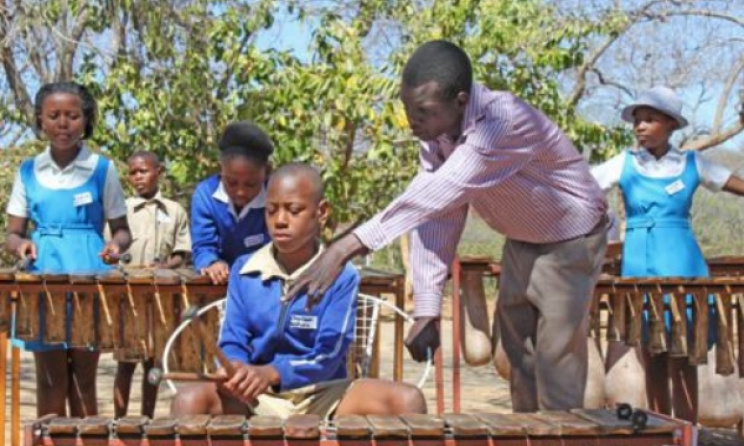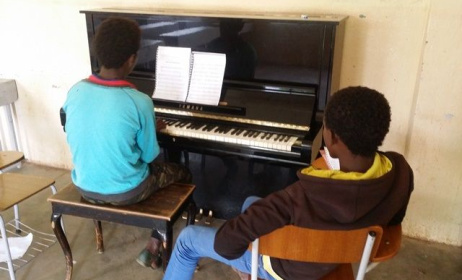Zimbabwe drafts new policy for Performing Arts education
Zimbabwe’s Ministry of Primary and Secondary Education has drafted a Junior School Visual & Performing Arts Syllabus for 2015 to 2022 with the support of the United Nations Children’s Fund (UNICEF). Representatives from the teaching profession and universities, creative civil society and the National Arts Council (NAC) participated in a consultative meeting in Harare recently.
 Music classes at the Zimbabwe Academy of Music. Photo: www.zimbabwemusicacademy.org
Music classes at the Zimbabwe Academy of Music. Photo: www.zimbabwemusicacademy.org
In its preamble, the Ministry of Primary and Secondary Education states that the syllabus is for Grades 3 to 7 and intends to help learners gain an understanding and appreciation of visual and performing arts. It also states that the visual and performing arts are a learning area that seeks to develop the skills of creativity, performance and originality. They involve music, dance, theatre and visual arts which can lead to entrepreneurship.
The Ministry also states that this syllabus is likely to place visual and performance arts in its socio-economic, political and cultural context in order to help learners understand and appreciate their culture and society. The syllabus will follow a developmental approach that will lead learners to grow into a mature relationship with music, dance, theatre and art through primary education. The rationale behind the draft syllabus is that it is imperative for learners to acquire curriculum based visual and performing arts skills and competencies as these are essential for employment creation, entrepreneurship, problem solving, critical thinking, creativity and self-discipline.
The Ministry of Primary and Secondary Education says the Junior School Visual & Performing Arts syllabus will cover theory and practical activities in areas such as sculpture, graphic design, painting, photography, drawing, print making, ceramics, crafts, collage, video and film making, whereas in performing arts it will cover dance, theatre, music, poetry, storytelling and puppetry.
The draft Junior School Visual and Performing Arts Syllabus comes on the back of a meeting between stakeholders in the arts, culture and sport sectors and the members of the panel leading the national curriculum review being undertaken by the Ministry of Primary and Secondary Education held on 15 January 2015 in Harare. The meeting resulted in stakeholders in the arts, culture and sport being urged to make written submissions to the national curriculum review panel through the Ministry of Primary and Secondary Education or the Ministry of Sport, Arts and Culture.
Earlier efforts
In 2001, Zimbabwe was among the member states of UNESCO that adopted the UNESCO Universal Declaration on Cultural Diversity, which called on member states to “incorporate, where appropriate, traditional pedagogies into education process with a view to preserving and making full use of culturally appropriate methods of communication and transmission of knowledge.”
In 2006, Zimbabwe participated in the First World Conference on Arts Education held in Lisbon, Portugal which adopted the UNESCO Road Map for Arts Education, which “offered an important theoretical and practical framework that provided guidance for advancing the qualitative development and growth of arts education.” In 2006 Zimbabwe also ratified the 2003 UNESCO Convention of the Safeguarding of the Intangible Cultural Heritage, which promotes intergeneration transmission of intangible cultural heritage through formal and non-formal education systems and which calls for the promotion of education for the protection of natural spaces and places of memory, whose existence is necessary for expressing intangible cultural heritage.”
In 2008, Zimbabwe ratified the 2005 UNESCO Convention on the Promotion and Protection of the Diversity of Cultural Expressions, which “endeavours to encourage creativity and strengthen production capacities by setting up educational, training and exchange programmes in the field of cultural industries.” In 2009 Zimbabwe was part of UNESCO member states at the World Conference on Education for Sustainable Development held in Bonn, Germany, which adopted the Bonn Declaration on Education for Sustainable Development.
In 2010, Zimbabwe participated in the Second World Conference on Arts Education in Seoul, South Korea, which adopted the Seoul Agenda: Goals for the Development of Arts Education, which stressed that arts education had “an important role to play in the construction and transformation of education systems that are struggling to meet the needs of learners in a rapidly changing world characterized by remarkable advances in technology.”
View the draft policy here.
This article was originally published by Nhimbe Trust.



























Commentaires
s'identifier or register to post comments